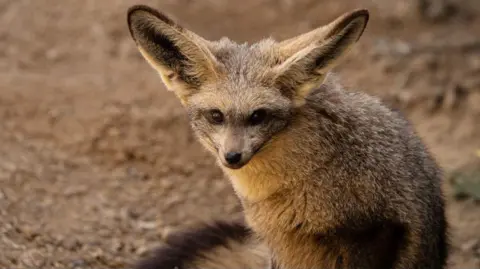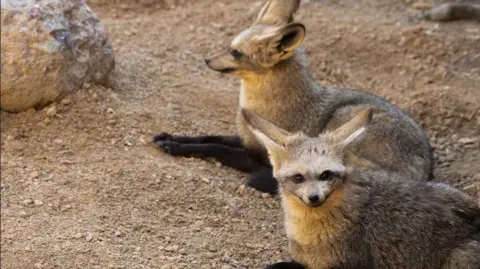Bat-eared foxes return to zoo after 30 year wait
 Chester Zoo
Chester ZooA zoo has welcomed two rare bat-eared foxes, 30 years on from when the animal was last there.
The two African foxes, which are known for their 13cm (five inches) tall ears, are said to be settling in well at Chester Zoo.
Sisters Maasai and Malindi will live alongside 12 porcupines in the zoo's new Heart of Africa habitat and will play a part in the zoo's conservation work.
David White, Chester Zoo's team manager, said: "It's incredibly exciting to welcome bat-eared foxes back to Chester Zoo after a 30-year hiatus and they're a wonderful addition to our new Heart of Africa habitat."
"They're a truly unique and fascinating species with some amazing adaptations," he added.
He said their "enormous ears aren't just for show – they act like satellite dishes and help the foxes detect the tiniest of movements coming from insects beneath the ground, allowing them to detect prey with pinpoint accuracy".
Zoo conservationists brought the sisters over to Chester from a zoo in Paris, France, with one of the sisters set to be introduced to a male fox as part of efforts to safeguard the little-known species.
Bat-eared foxes were given their name due to their distinctive oversized ears and they are found in the open savannahs and arid grasslands of eastern and southern Africa.
In the wild, bat-eared foxes face increasing threats, largely due to habitat loss caused by agriculture, human encroachment and hunting, a zoo spokesperson said.
 Chester Zoo
Chester ZooDavid White said that like many species found in the African savannah, bat-eared foxes were under threat as their habitat became more fragmented as a result of human activity.
"That's why our teams are on the ground in several national parks across Kenya and Uganda safeguarding some of the continent's rarest species like northern giraffe, giant pangolins, mountain bongo and Eastern black rhino," he said.
"By protecting these species and their habitats we're also helping many of Africa's little known species like bat-eared foxes, that share the same habitats, to go on to thrive once again."
Read more stories from Cheshire on the BBC, watch BBC North West Tonight on BBC iPlayer and follow BBC North West on X. You can also send story ideas via Whatsapp to 0808 100 2230.
